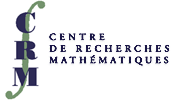 |
|
||||
Org: Pietro-Luciano Buono (UOIT) et Victor LeBlanc (Ottawa)
[PDF]
- JACQUES BELAIR, Université de Montréal
Distributed delays and stability in artificial neural networks [PDF] -
We consider a distributed delay neural network representation of a conceptual model of spatial memory in the form of the system
Sufficient conditions are derived for the uniqueness and global asymptotic stability of a stationary solution. Local analysis is used to determine stability boundaries for many delay distributions, in terms of possibly complex eigenvalues of a matrix closely related to the (not necessarily symmetric) connection matrix of the network. These results are compared to the discrete delay case, and an illustrative application is semi-numerically examined.dUi(t) dt= -bi Ui(t) + N
å
j=1aij ó
õt
-¥Kij (t-s) g æ
èbUj (s) ö
øds + Fi(t), i = 1,...,N. - ELENA BRAVERMAN, University of Calgary, 2500 University Drive NW, Calgary, AB, T2N 1N4
On oscillation and stability of equations with a distributed delay [PDF] -
We consider nonlinear equations with a distributed delay which involve integrodifferential equations. In the case of a single variable concentrated delay we have the equation x¢(t) = r(t) [ f ( x ( t-h(t) ) ) - x(t) ] which is compared to the difference equation xn+1 = f(xn). In particular, under certain conditions global attractivity of the latter equation implies stability of the former one, independently of a bounded delay. We also present some delay-dependent stability, oscillation and non-oscillation conditions. The results are applied to the Nicholson's blowflies equation and the Mackey-Glass equation with a distributed delay.
This is a joint work with L. Berezansky, D. Kinzebulatov and S. Zhukovskiy.
- PIETRO-LUCIANO BUONO, UOIT
-
- SUE ANN CAMPBELL, University of Waterloo, Waterloo, ON
Delay Induced Canards [PDF] -
We consider a model for regenerative chatter in a drilling process. The model is a nonlinear delay differential equation where the delay arises from the fact that the cutting tool passes over the metal surface repeatedly. For any fixed value of the delay, a large enough increase in the width of the chip being cut results a Hopf bifurcation from the steady state, which is the origin of the chatter vibration. We show that for zero delay the Hopf bifurcation is degenerate and that for small delays this leads to a canard explosion. That is, as the chip width is increased beyond the Hopf bifurcation value, there is a rapid transition from a small amplitude limit cycle to a large relaxation cycle. Our analysis relies on perturbation techniques and a small delay approximation of the DDE model. We use numerical simulations and numerical continuation to support our analysis and to determine when the small delay approximation fails. We discuss how our results may apply to other systems with time delays.
This is joint work with Emily Stone and Thomas Erneux.
- YUMING CHEN, Wilfrid Laurier University
Equivariant normal forms for parameterized delay differential equations with application to equivariant Hopf bifurcation [PDF] -
This talk concerns with the equivariant normal form of delay differential equations with parameters in the presence of symmetry. We present and justify a process that involves center manifold reduction and normalization preserving the symmetry, and that yields normal forms explicitly in terms of the coefficients of the original system. We observe that the form of the reduced vector field relies only on the information of the linearized system at the critical point and on the inherent symmetry, and the normal forms give critical information about not only the existence but also the stability and direction of bifurcated spatiotemporal patterns. We illustrate our general results with application to equivariant Hopf bifurcation.
- QINGWEN HU, The University of Western Ontario, Dept. of Applied Mathematics, London, ON, N6A 5B7
Global Continua of Periodic Solutions of Differential Equations with State-Dependent Delay [PDF] -
We apply the recently developed global Hopf bifurcation theory to examine global continuation with respect to the parameter for periodic solutions of functional differential equations with a state-dependent delay. As major components toward this goal, we establish sufficient geometric conditions to ensure the uniform boundedness of periodic solutions and then prove the existence of rapidly oscillating periodic solutions by obtaining an upper bound of the period of the nontrivial periodic solutions in a connected bifurcation branch.
- TONY HUMPHRIES, McGill University, Montreal
State Dependent Advanced-Delay BVPs [PDF] -
Although not widely considered in the literature, several problems, including travelling waves on lattices, naturally give rise to advanced-delay boundary value problems. Since there is very little theory to underpin these problems, numerical results are needed to provide intuition, but are themselves difficult to obtain. Problems are compounded by state-dependency of the delay terms. We highlight ongoing work in this area, illustrating the issues using a Bando discrete car-following model with reaction time delay, and some model problems with linear state-dependency.
- JEROEN LAMB, Imperial College London
On homoclinic bifurcation in advance-delay equations via Lin's method [PDF] -
The study of travelling waves in a 1D lattice with Z \ltimes Z2 symmetry reduces to the study of solutions of a "reversible" advanced-delay equation (ADE). We present an extension of Lin's method for ODEs by which we prove that any Z2-invariant localized travelling wave (bi-asymptotic to the trivial state) is accumulated by a one-parameter family of periodic travelling waves.
This is joint work with Marc Georgi (Free University Berlin), Alice Jukes and Kevin Webster (Imperial College London).





